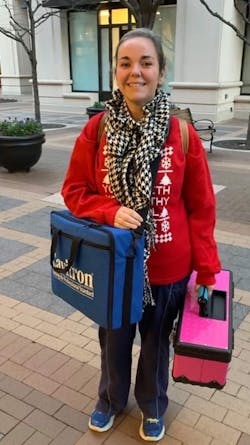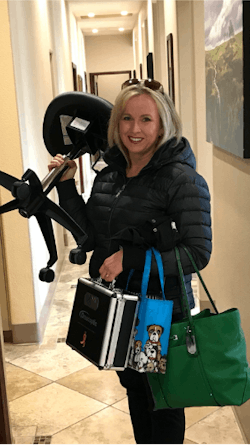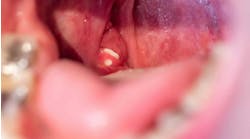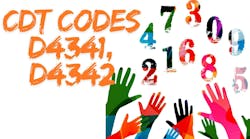On the road again—solid tips and tricks for a smooth temping journey
Years ago, people graduated, took a position, and stayed at the same job for decades. But today, workers all over the country are on the move. They are no longer staying at the same job year after year. The gig economy has rapidly reshaped workforce patterns, and the COVID-19 disruption has many hygienists reconsidering their professional careers.
While working as a substitute or temporary hygienist is not a new phenomenon, more hygienists than ever are now considering taking short-term positions. The terminology is even changing. Many now refer to themselves as “guest hygienists.”
Many hygienists are either confused or uncertain about transitioning from a permanent office to working as the hygienist du jour. RDH magazine recognized the gap and created a virtual roundtable where clinicians who are well versed in a particular subject have the opportunity to share what they know in an open, nonscripted format.
On August 13, 2020, Jen Collins, BS, RDH, and Kelly Divito, BSDH, RDH, participated in the first roundtable discussion, focused on working as a temporary hygienist. The 45-minute discussion covered what to expect from an assignment, basic ways to prepare to be the guest worker, leveraging a new career pathway, and tips on how to become the requested hygienist du jour. If you’re considering temping or want to up your game in that arena, here are some highlights from that lively discussion.
What motivated you to start working as a temp/guest hygienist?
Kelly graduated from Ohio State University 12 years ago. She started her career going to as many general and specialty practices as she could, knowing that every office would be different. This postgraduate education exposed her to diverse computer software platforms, different ways to communicate with patients, many new products, and a wide range of treatment options.
Temping added diversity and depth to Kelly’s résumé in a very short period of time, an asset that has been very handy as she and her military husband crisscross the nation every two years.
Jen switched to temping after decades of being in traditional office settings. Jen’s longing to grow more professionally started many years ago. While she was devoted to her career, she started feeling stifled after a long stint in a multidoctor practice. Every year, when she attended RDH Under One Roof conferences, she became more convinced that change was necessary.
Even though it was hard to pull the plug on a predictable environment, Jen took the plunge into the temporary world seven years ago. Although it seemed risky at first, the challenge gave her exposure to a wide range of practices in Chico, a small, rural Northern California community.
How do you find and book temp opportunities?
Once again, Jen and Kelly’s experiences could not be more different. When Jen decided to join the temping world, she visited local offices in person. Armed with a résumé, she let the staff know that she was available for a wide variety of assignments that could range from single-day, last-minute assignments to longer engagements that included coverage for maternity, bereavement, vacations, personal leaves, or illness.
Jen and her close colleagues quickly formed a consortium. She positioned herself as a guest hygienist in their practices. Jen became the permanent, number-one backup for many offices, often booking assignments months in advance. When Jen couldn’t fill an assignment, she offered dental offices a list of trusted colleagues. After temping at an area practice, Jen recently accepted a permanent position, but still helps area hygienists who work in the temporary arena.
For a dozen years, Kelly and her husband have been required to pack up and move to new locations every couple of years. That is the military life, and the constant movement creates an amazing challenge on multiple levels. Imagine having to get another state license every couple of years, integrating into a new community, and then trying to find a clinical job.
Kelly’s strategic approach is three pronged. For years, she has relied on DentalPost, an established national job board, to provide a heads-up on the local culture, salary ranges, and potential temporary and permanent positions. When Kelly’s husband gets a new assignment, she immediately starts studying the employment culture in her future home. With only two months’ notice, she moved 200 miles from the suburbs of the nation’s capital to a rural area in Maryland over the 2019 Christmas holidays. DentalPost’s consistent, reliable content has served Kelly well.
In addition to scoping out the landscape ahead of time, Kelly also works part-time as a product educator, providing lunch-and-learn events for dental practices. This gives her a sneak peek into an office culture. She also joins the local dental hygiene association, which gives her an immediate connection with area hygienists and allows her to network with like-minded colleagues.
Should you take your own equipment or expect an office to provide everything you need?
Both Jen and Kelly have the same primary focus: patient care. With this goal in mind, they each take what they need to create their own unique comfort zone. Both Jen and Kelly are very adaptable, but they also know what will keep them on track. It is important to both to be team players who can blend in seamlessly, even if it is only for a day, so not having to worry about every detail in an office allows them to be the perfect guest hygienists.
Over the years, Jen has invested thousands of dollars in equipment. Jen arrives at every office with her Orascoptic XV1 loupe/light combo, her Crown Seating saddle, and a couple of lab jackets. She takes a tote with a water bottle, personal hygiene items, and an essential daily dose of chocolate. Her loupes carrying case has just enough extra room for her name tag and a clock. Jen can adapt to most gloves and masks for a day or so, but if the assignment is longer, she will ask a practice to supply her preferred product choices. Prior to the actual workday, she sends all of the necessary paperwork to the business administrator to ensure she is to be paid as an employee, not an independent contractor. She includes a copy of her driver’s license, dental hygiene license, and a completed W4 form, and lets the office know that she does not need a check at the end of the day and is willing to be paid on the established payday.
Kelly arrives at assignments with a large pink toolbox on wheels. It has everything she might need in a workday. Kelly does not unpack the whole box, but she knows that she is armed with what she needs to make the day work. Her array includes a clock, prophy paste, hand instruments, spare scrubs and jacket, a laundry bag, and a power-driven scaler. Last week she added a box of Orascoptic disposable face shields to her armamentarium. While she is not back in practice yet due to childcare and homeschooling issues, Kelly is thrilled that her new shield fits with her loupes/headlight system so well. She was surprised at how comfortable the shield turned out to be and is happy to have a product that she can simply leave behind at the end of the day.
Having a say in the matter
Typically, panelists are the only ones in a roundtable discussion, but today’s virtual world makes it possible for attendees to have their say on important topics. A number of hygienists submitted questions during the event, and we were able to provide answers to a handful at the end of the session, but clearly others required more detailed comments than the time frame allowed. In addition, the session included two different audience polls. The answers provide insight into what is on our minds as we transition back into the clinical setting. Unlike decades ago, it is also clear that equipment ownership is a mainstream approach to our clinical careers. Half of the audience members indicated that they were thinking about getting new loupes. Adequate budgeting for a new purchase is clearly top of mind for many.
What is your overriding number one thought as you get back to work?
- 26% Ready to get back; there’s lots of opportunity out there!
- 4% Childcare is making it difficult to accept positions.
- 22% Overwhelmed by PPE issues and confusing office protocols.
- 25% Worried about my health or the health of my family.
- 28% Want to use my power-driven scaler!
There is a lot of chat online about getting a backup pair of loupes. What are your thoughts on having a second system?
- 17% Would never work without a backup pair of loupes.
- 20% Considering getting a new pair of loupes.
- 34% Never thought about having a backup system.
- 29% Thought about a new pair but need a plan to fit it into my budget.
A round of applause please
Events like this do not happen in a vacuum. They take careful planning and financial support. Kelly, Jen, and I want to say thank you to RDH magazine for embracing our vision, and to Orascoptic and DentalPost, two amazing US-based companies, for providing the necessary funding.
While Orascoptic and DentalPost are entirely different companies, both are focused on keeping dental professionals safe and productive in today’s ever-changing and ever-challenging world. Wisconsin-based Orascoptic creates custom-fitted magnification and illumination devices that have allowed hundreds of thousands of clinicians to work in safety and comfort over decades, while delivering optimal care.
Atlanta-based Tanya Lanthier, RDH, created DentalPost 16 years ago to bridge the employment gap between clinicians and dental practices. To date, as the nation’s largest job board, it has served the needs of more than 850,000 job seekers and more than 35,000 dental practices.
While it is impossible to cover every nuance of the temping world in less than an hour, Jen and Kelly provided attendees with some realistic expectations about being the hygienist du jour and how to avoid some very nasty pitfalls through better planning. Now that we’ve given you a taste of what to expect, click here to enjoy the entire session! Be prepared to laugh, learn, and walk away with a better understanding of the guest hygienist world.
Meet the panelists
Kelly Divito, RDH, BS
As a military wife, Kelly and her family are on the move every couple of years. Her ability to adapt to new and challenging situations is extraordinary. As the first woman in her family to graduate from college, Kelly does not take the value of education lightly. Education and resiliency are critical, and she and her husband aspire to instill those values in their son in today’s uncertain educational world. Kelly is a natural networker, a trait that allows her to blend in to each new setting as her family transitions to each new community. Over the last decade, she has honed her skills as a guest hygienist by providing exemplary services in a wide range of clinical settings from coast to coast.
After years of working as a permanent employee, Jen Collins joined the ranks of dental hygienists who earn their income working on short-term assignments. Jen quickly perfected the art of temping and soon became the hygienist of choice, covering for her colleagues when they needed time off, all while completing a BS degree in her off hours. Even though Jen has very clear ideas about how she wants to practice, her adaptable nature quickly puts new teams and patients at ease. She has created templates and processes that allow her to be paid in a timely and legal fashion with no surprises at either end of the bargain. Jen and her husband share their days with two lively fur babies.
ANNE NUGENT GUIGNON, MPH, RDH, CSP, has received numerous accolades over four decades for mentoring, research, and guiding her profession. As an international speaker and prolific author, Guignon focuses is on the oral microbiome, erosion, hypersensitivity, salivary dysfunction, ergonomics, and employee law issues. She may be contacted at [email protected].









